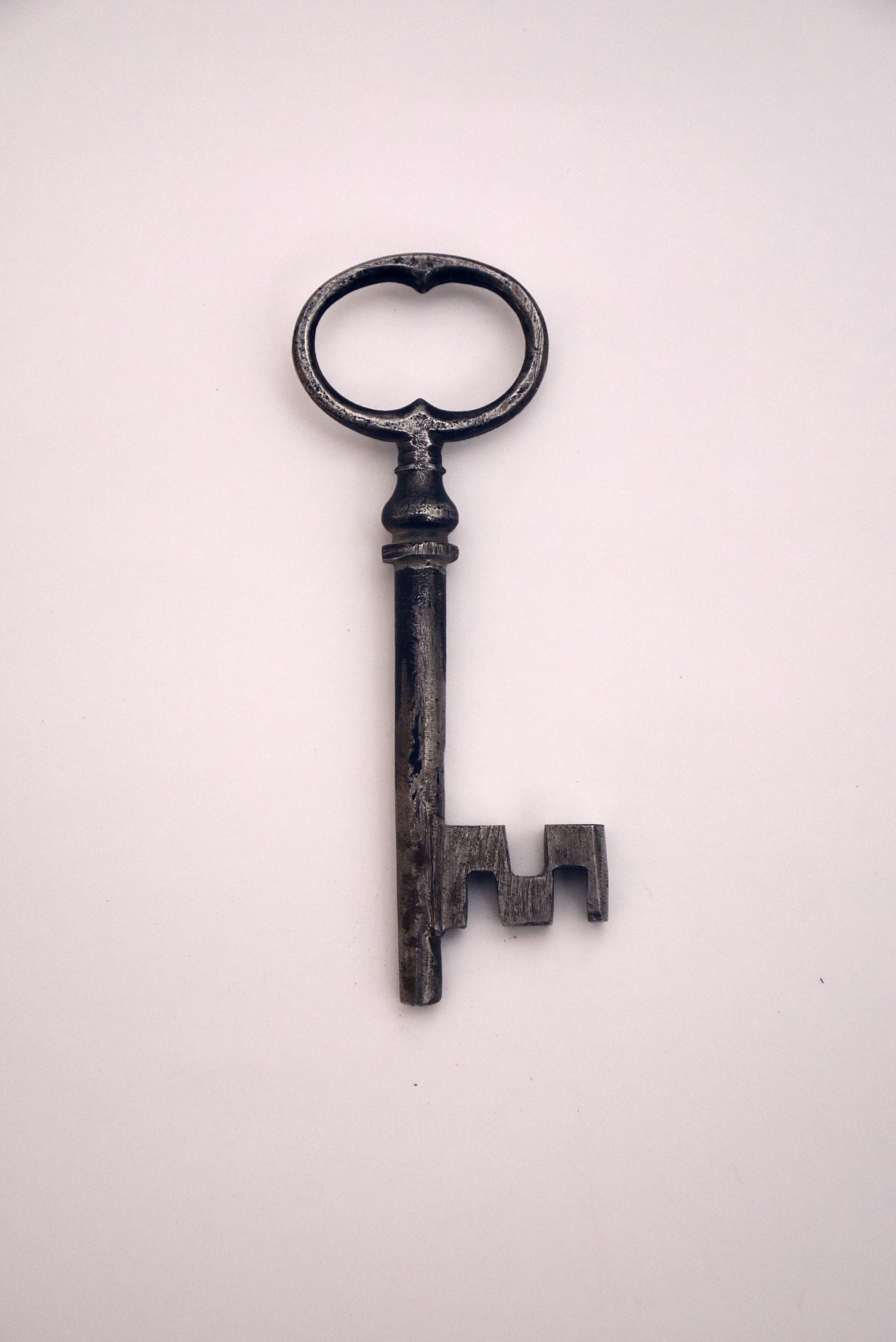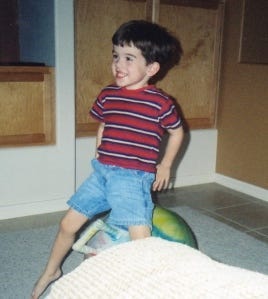Hi all! In celebration of It’s Like This hitting a new mark of 100 subscribers (oh sure, I’ve been writing on Substack for 2 years…but, slow and steady, right? 🐢), I’m pulling an essay from my “Before This” file today. This is the first piece I ever wrote about my son, and the first to be published—in a beautiful anthology of stories about mothering called Monday Coffee. I’ve added an audio “read along” version here, so even if you’ve read this before, there’s something here for you.😊
Thank you to all my new and old readers!! And if you know anyone who may want to read along, please spread the word!
Standing on my back patio, I watch my five-year-old son through the sliding glass door. He bounces around the kitchen on his large blue exercise ball, happily unaware that he has just locked his mother out of the house.
He didn’t mean to lock me out. I stepped out—just for a moment—to throw something away, and I left the door open. After I went around the corner of the house to the garbage bins, my son simply returned the door to its “normal” state: closed, with the latch pointed down. That’s how the handle always looks from the inside.
Like many other autistic people, my child exhibits a keen awareness of his surroundings, and tends to “fix” things that he deems out of place. Lights on that should be off, books rearranged on shelves, doors that must be closed, and latches returned to their down and locked positions.
“Unlock the door, hon,” I say, shaking the handle. He rolls his ball over to the door and presses his palms against the glass. He grins at me and sits back down on his ball.
I instruct him: “Pull up,” and mime lifting the latch. He slides off the ball and copies my hand motions in the air, his fingers hovering inches from the handle.
“OPEN DOOR,” I demand, failing in my attempt to keep the growing worry out of my voice. My son laughs and repeats, “Open door!” But he does not understand.

It all comes down to this—all the hours of behavioral and speech therapy, doctors’ appointments, IEP meetings and filing cabinets full of data sheets and treatment goals. If my son founders on a simple instruction to unlock the door, what does it matter if he knows his colors, his shapes? If he can recite the alphabet forwards and backwards? What does it matter if he expands his limited verbal ability to place “I want” before a request for juice or a cookie, if he fails to comprehend my words when danger looms?
I run across the street to my neighbor’s house to call my sister-in-law, the only person with a spare key since my husband is out of town. Her phone goes to voicemail. I race back home, convinced that my son is either upset by my absence or getting himself into some kind of trouble.
I find him perfectly content in the air-conditioned house, bouncing on his ball near the kitchen table, taking bites of his lunch. Dear God, please don’t choke. I go back to my neighbor’s house to call a locksmith, cursing myself for not hiding a key outside. The locksmith estimates his arrival at twenty minutes. How many things can go wrong in twenty minutes?

I return to my patio to wait where I can watch my kid behind glass, trying every so often to get him to let me in. From my isolated vantage point, the newly exposed hazards of my once-child-safe kitchen mock me. I begin to strategize. Which window will I break if he grabs that sharp knife off the counter, or if he climbs up on the still-warm stove? Can I throw this metal patio chair hard enough to break the glass if he falls off that damned ball and cracks his head on the hard tile floor?
Oblivious to the threats that surround him, my son laughs and bounces and taps on the glass between us.
Just as I reassure myself that at least I can keep an eye on him, my kid leaves the room. He runs into my bedroom where, of course, the window shades block my view. I can’t see him, but I can hear him jumping on the bed, a favorite pastime that I instantly redefine as reckless.
He yells, “Jumponthebed!”—one of the rare times he calls for me to play. I stand helpless to respond.
Then it happens. My son reappears, running into the kitchen and over to me at the door. He pulls on the handle, notices the latch and—without hesitation—flips it up and slides the door open.
I am stunned by the speed at which my dilemma evaporates. My kid, in turn, looks bewildered by his mother’s enthusiastic and borderline hysterical response. I cry and hug and sigh and he just smiles, as if to say: It’s about time, Mom, what were you doing outside for so long?

It is not always about ability. More often it is about motivation. My child could easily learn how to unlock the door; he just needed a reason. Some people with autism spectrum disorder can find it difficult to see the world from another’s perspective—my need to get inside, to get past that locked door, didn’t concern my son. Until it became his need.
Years later, this experience still shapes my interactions with my child. Of course, we moved the goal of teaching the instruction “unlock” to the top of the priority list (and yes, we now hide a spare key). But, the most important thing I can do is to give my son ample reason and motivation to use and strengthen his abilities; to discover what will entice him to open the doors that stand between us, waiting to be unlocked.
“Opening Doors” and another of my early pieces, “Tough Love,” appear in Monday Coffee & Other Stories of Mothering Children with Special Needs, edited by Darolyn "Lyn" Jones and Liz Whiteacre (INwords Publications, 2013).
Drop me a comment, or respond to this email (private to me at itslikethis@substack.com)—I would love to hear from you!
Or meet me over on Substack Notes, which has become a cool place to find other writers and readers who talk about what they are writing and reading.
Thanks for reading and/or listening! Please Subscribe if you haven’t already to receive new posts in your email (or on the Substack app) once or twice a month.









This story had me on the edge of my seat!
It was such a simple mishap that had the potential for such scary consequences.
I really enjoyed hearing about your inner dialogue especially —“Can I throw this metal patio chair hard enough to break the glass if he falls off that damned ball and cracks his head on the hard tile floor?” —- that really emphasised the gravity of the situation.
Great piece, and congrats on getting it published.
Also, Congrats on 100 subscribers!
Firstly congratulations on reaching 100 🎉 that’s awesome! Secondly this has so many parallels to my life with Mars, and as he is 5 now it really hits home. There are so many extra layers of stress that are added in situations like this and numerous thoughts to process on the “what ifs”. I’m so glad it turned out ok in the end!